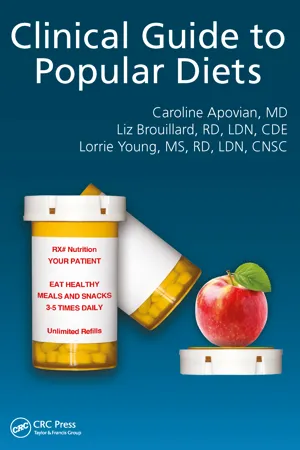
Clinical Guide to Popular Diets
Caroline Apovian, Elizabeth Brouillard, Lorraine Young
- 158 pagine
- English
- ePUB (disponibile sull'app)
- Disponibile su iOS e Android
Clinical Guide to Popular Diets
Caroline Apovian, Elizabeth Brouillard, Lorraine Young
Informazioni sul libro
It is no secret that the United States is facing an obesity epidemic with the obesity rates continuing to rise year after year. According to the Center for Disease Control, one third of Americans are now obese. It is no longer sufficient to simply point out the health risks of obesity to our patients as the reason to lose weight. Patients are seeking guidance in terms of what specific diet plan to follow and what foods should be eaten. There are thousands of diets on the market with new ones introduced daily. Not all diet plans have proven results, nor will they work for every patient. More importantly, not all diets marketed to the public are safe to follow for an extended timeframe. In fact, research shows us that diet composition is not the key to long term success, but compliance to a calorie deficient diet is the solution. So how does one choose which diet plan to recommend to patients?
Finally, a book for clinicians is here to help answer this question. This book provides information to help patients understand several different research proven diets on the market today including: the Atkins diet, the DASH (Dietary Approaches to Stop Hypertension) diet, the I diet, the Mediterranean diet, Paleo Diets, South Beach, Vegetarian diets, Weight Watchers, and the Zone diet. Each diet is carefully and thoroughly reviewed in this book by some of America's top obesity medicine and weight management specialists to provide health practitioners a knowledge of the diet composition, current research evaluating the diet, typical weight loss results, the pros and cons of the diet as well as which patients would most benefit from each diet plan.
This book provides the necessary tools for clinicians to feel comfortable discussing several of the more popular and scientifically researched diets with patients. This book offers solid information to advise patients, based on their specific health history, on which diet will afford the greatest chance for success.